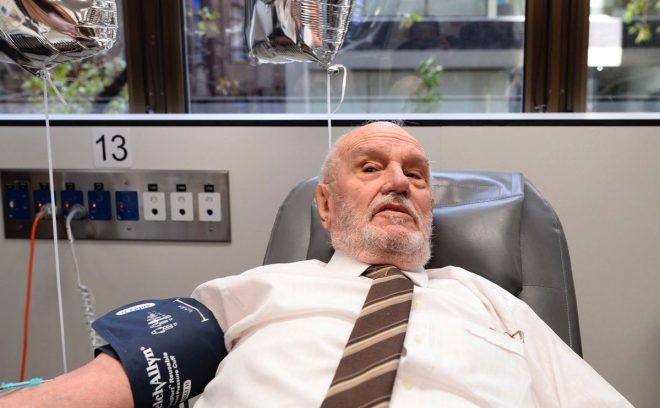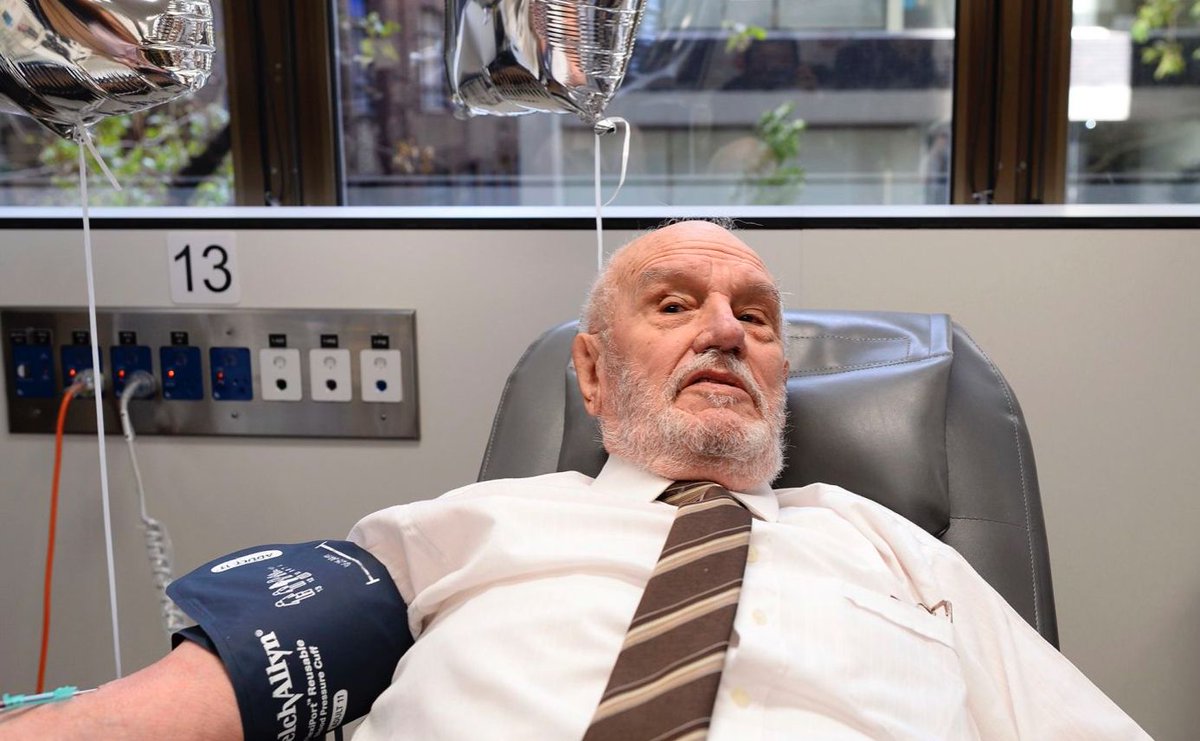
Death- Obituary News
James Harrison: The Blood Donor Who Saved Over Two Million Lives
James Harrison, an extraordinary individual known for his monumental contributions to medicine, has passed away at the age of 88. Harrison’s legacy is not one marked by fame in the usual sense, but rather by his remarkable act of altruism that saved the lives of more than two million babies. His unique blood plasma contained a rare and invaluable antibody known as Anti-D, which played a critical role in the development of a life-saving medication for expectant mothers.
The Lifesaving Antibody: Anti-D
Anti-D is an essential antibody used in the treatment of Rh disease, a condition that can occur during pregnancy when an Rh-negative mother carries an Rh-positive baby. If the baby’s Rh-positive blood enters the mother’s bloodstream, her immune system may produce antibodies against it, leading to serious health complications for the baby, including brain damage or even death.
James Harrison’s blood was exceptional; it contained this rare antibody in such high quantities that it became a crucial resource for medical professionals. His blood donations were used to create Rh immunoglobulin, a medication that prevents the mother from developing antibodies against Rh-positive blood cells. This innovation has been credited with saving countless lives and drastically reducing the incidence of Rh disease in newborns.
- YOU MAY ALSO LIKE TO WATCH THIS TRENDING STORY ON YOUTUBE. Waverly Hills Hospital's Horror Story: The Most Haunted Room 502
A Lifetime of Generosity
Harrison’s journey as a blood donor began when he was only 14 years old, following a major surgery that required a significant transfusion of blood. Inspired by the impact of blood donations, he made it his mission to donate blood regularly. Over the course of his lifetime, he donated blood more than 1,100 times. His commitment to this cause was unparalleled, and he became a national hero in Australia, where he was affectionately known as the "Man with the Golden Arm."
The sheer volume of his donations and the unique properties of his blood plasma allowed him to contribute significantly to the medical community’s understanding and treatment of Rh disease. His contributions have saved the lives of more than two million babies, making him an irreplaceable figure in the field of obstetrics and gynecology.
Recognition and Awards
Throughout his life, Harrison received numerous accolades for his philanthropic efforts. He was honored by various organizations and institutions that acknowledged his selflessness and the profound impact of his donations. In 2015, he was awarded the Medal of the Order of Australia, one of the highest honors in the country, recognizing his exceptional contributions to the health and well-being of mothers and their children.
Harrison’s story has inspired many to consider the vital role of blood donations in saving lives. His legacy serves as a reminder of the power of altruism and the difference one person can make in the world.
The Impact of Harrison’s Work
James Harrison’s work has had a lasting impact on maternal and child health. The development of Rh immunoglobulin has not only saved lives but has also transformed the standard of care for expectant mothers. Prior to the availability of this treatment, Rh disease was a leading cause of infant morbidity and mortality. Today, thanks to Harrison and others like him, many mothers can give birth to healthy babies without the fear of Rh-related complications.
Harrison’s contributions extend beyond just the medical field; they serve as a beacon of hope and a call to action for individuals to engage in blood donation. His life exemplifies the idea that everyone has the power to make a difference, and that small acts of kindness can lead to monumental changes in society.
The Legacy Continues
Although James Harrison has passed away, his legacy will continue to inspire future generations. His story encourages individuals to consider becoming blood donors and highlights the importance of donating plasma, which is often overlooked. The need for blood and plasma donations is constant, and Harrison’s life serves as a powerful reminder of the impact that these donations can have on the lives of others.
In the wake of his passing, medical organizations and blood donation centers are likely to see a renewed interest in blood and plasma donations. Harrison’s story is a compelling narrative that emphasizes the collective responsibility we all share in ensuring that those in need receive the help they require.
Conclusion
James Harrison’s life was a testament to the power of generosity and the importance of blood donations in saving lives. His contributions have saved over two million babies, and his legacy will undoubtedly continue to resonate within the medical community and beyond. As we remember Harrison’s incredible journey, let us also honor his memory by stepping forward to donate blood and plasma, ensuring that others can benefit from the life-saving treatments made possible by generous donors.
In a world where the need for blood and plasma is ever-present, Harrison’s story is a powerful reminder that each of us has the potential to make a profound impact on the lives of others. By following in his footsteps, we can help create a healthier future for mothers and their children everywhere.

James Harrison, a prolific blood donor famed for having saved the lives of more than TWO MILLION babies, has died at age 88.
Harrison’s plasma contained a “rare and precious antibody” known as Anti-D which was used to manufacture a medication given to expectant mothers.… pic.twitter.com/1wHTZWE9JY
— Yashar Ali (@yashar) March 4, 2025
James Harrison: A Legacy of Life-Saving Donations
James Harrison, a prolific blood donor famed for having saved the lives of more than TWO MILLION babies, has died at age 88. His remarkable journey began when he made his first blood donation at just 18 years old, and it didn’t stop there. Harrison became an iconic figure in the world of blood donation, earning the nickname “The Man with the Golden Arm.” This title wasn’t just a catchy phrase; it stemmed from the incredible impact his donations had on countless lives.
The Power of Anti-D Antibody
What made Harrison’s donations so extraordinary was his unique plasma, which contained a “rare and precious antibody” known as Anti-D. This antibody plays a critical role in preventing Rh disease, a condition that can occur when a pregnant woman’s blood type is incompatible with her baby’s. Without intervention, this can lead to severe complications for the baby, including brain damage or even death. Harrison’s plasma was used to manufacture a medication that has saved countless newborns, making him a true hero in the medical community.
A Lifesaving Journey
Harrison’s dedication to donating blood was driven by a personal experience. After receiving a life-saving transfusion himself at a young age, he realized just how vital blood donations are. His journey was not just about giving blood; it was about giving life. Over the decades, he became a regular donor, making over 1,100 donations throughout his lifetime. His commitment was unwavering, and it sparked inspiration in many others to follow suit.
The Impact on Families
Imagine being a parent facing the uncertainty of your baby’s health due to Rh incompatibility. Thanks to the medication created from Harrison’s donations, many families were spared the anguish of losing a child. Stories of parents whose babies were saved by the Anti-D medication are numerous. These heartfelt accounts underscore the profound impact one person can have on the lives of so many. James Harrison was not just a donor; he was a beacon of hope for expectant mothers everywhere.
A National and Global Recognition
Harrison’s contributions did not go unnoticed. He received numerous awards and accolades throughout his life, including being named Australian of the Year in 2003. His story captured the hearts of many, and he became a symbol of altruism in Australia and beyond. His legacy transcends borders, showing that one person can indeed make a difference in the world. The medical community has heralded Harrison as a pioneer in blood donation, setting a standard that many strive to meet.
Challenges Faced
Despite his heroic efforts, Harrison faced challenges, including the physical toll that regular donations can take on the body. However, he never let these obstacles deter him from his mission. His resilience and dedication serve as an inspiration to all who have considered making a difference in their communities. James Harrison’s story is not just about blood donation; it’s about perseverance, compassion, and the enduring spirit of giving.
Continuing the Legacy
In the wake of Harrison’s passing, there’s a renewed call to action for blood donation. His story serves as a powerful reminder of the importance of donating blood and how it can save lives. The need for blood donors remains critical, and organizations worldwide are urging individuals to step up and contribute. By sharing Harrison’s legacy, we can inspire a new generation of donors who can continue the fight against Rh disease and other blood-related conditions.
How You Can Make a Difference
If you’re inspired by James Harrison’s incredible story and are considering becoming a blood donor, there are many ways to get involved. Most local hospitals and blood banks offer simple procedures for donating blood. It’s a quick, safe process that can ultimately save lives. You don’t need to have special qualifications—just a willingness to help others. The impact of your donation could be as profound as Harrison’s, and it’s a way to honor his memory by continuing the work he started.
Conclusion: A Life Well-Lived
James Harrison’s legacy will live on through the countless lives he saved and the inspiration he provided to others. His dedication to blood donation and the creation of life-saving medication for expectant mothers are testaments to his character and compassion. As we reflect on his life, let us remember the importance of giving and the incredible difference one person can make. Harrison was more than just a donor; he was a true hero whose story will continue to inspire future generations.
“`
